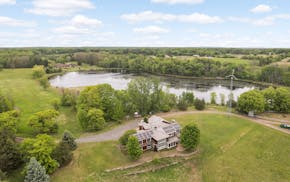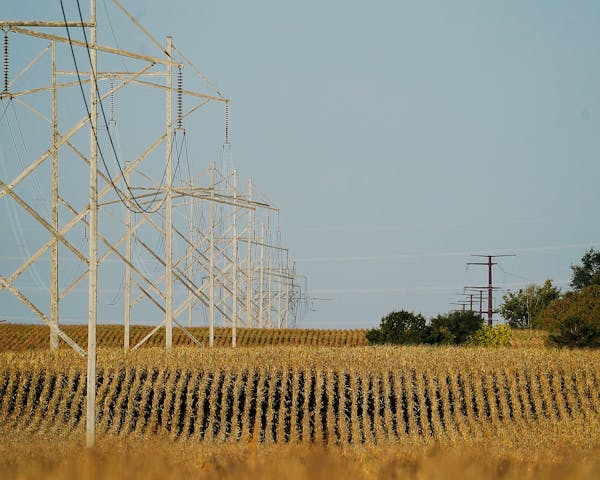Otter Tail Power Co. must exit a large North Dakota coal plant by 2032 — at least as far as its Minnesota customers are concerned, state regulators ruled Thursday during a contentious meeting.
Looming over the Minnesota Public Utilities Commission's decision were the starkly different energy policies of Minnesota — which is pushing hard on clean energy — and North Dakota, which is focused on preserving its coal industry and a fleet of coal-fired power plants.
At issue: Fergus Falls-based Otter Tail only owns 35% of the power plant, called Coyote Station. So the plant could run at partial capacity after 2031.
Otter Tail's two largest power generators — Coyote and another in South Dakota — are co-owned by companies beyond the purview of the PUC. About half of the utility's customers also are in the Dakotas.
Some PUC commissioners made clear Thursday they believe Otter Tail should exit high-cost Coyote Station by 2029. Otter Tail says that's not feasible given the interests of the plant's co-owners.
"I just find this to be a massively frustrating conversation," PUC Commissioner Joe Sullivan said at a meeting Thursday. "I sympathize with Otter Tail, you have two different jurisdictions that look at the world differently. But if [Coyote Station] were in Minnesota, we'd say, 'Otter Tail, it's time to pull out.'"
The Coyote Station plant, Sullivan added, is "uneconomic."
Coyote Station, outside Beulah, N.D., is also a particularly dirty coal plant, emitting far more sulfur dioxide, nitrogen oxide and mercury than any coal plant in Minnesota. It's depreciable life runs through 2040.
The PUC on Thursday ruled on Otter Tail's latest long-term resource plan, which every Minnesota investor-owned utility must file every few years. In 2021, Otter Tail submitted a resource plan calling for a sale of its stake in Coyote Station by the end of 2028.
At the time, Otter Tail said the plant had become too costly for customers and would no longer be needed as the utility adds more renewable energy. But last year, Otter Tail reversed course on the 2028 date, saying it needed to keep its Coyote Station stake indefinitely due to increasing "uncertainties and risks."
However, the company proposed to use its Minnesota stake in the plant only when the Midwest's main grid operator declares an emergency. Such emergencies occur during storms and heat waves when power demand suddenly spikes.
The Minnesota Department of Commerce generally agreed with Otter Tail's Coyote Station plan, while the Minnesota Attorney General's Office did not. Both represent customers before the PUC. Several clean energy groups also opposed keeping Coyote Station open beyond 2028.
Earlier this week, Otter Tail officially amended its proposal, saying it would exit Coyote Station by 2031 — establishing an end date for the first time after the skepticism from the PUC and clean power groups.
"We have limited options as to how we can extricate ourselves from the Minnesota portion of the plant," Cary Stephenson, an Otter Tail attorney, told the PUC. "If we have a date that is too early, then it creates a fire sale situation."
Some PUC members expressed reservations about Otter Tail's plans for Coyote Station. "All of the commissioners have really deep concerns about what you brought to us," said PUC Chair Katie Sieben.
But the PUC approved a 2031 Coyote Station exit — with several conditions — by a 4 to 1 margin. Sullivan cast the "no" vote.
The PUC on Thursday also approved Otter Tail's proposal for a liquified natural gas storage facility at its gas-fired Astoria power station in South Dakota. The plant is aimed at improving reliability when power demand spikes; Otter Tail declined to disclose its cost.
The PUC also approved an additional 200 to 300 megawatts of renewable power for Otter Tail, to be installed before 2030. And the PUC told Otter Tail to roll out 20 to 75 megawatts of battery storage by the late 2020s. Clean energy groups had lobbied for the battery storage, not Otter Tail.
Some commissioners were irked that Minnesota ratepayers may end up paying the entire costs of the new renewables. An Otter Tail representative told the PUC that North Dakota regulators did not want to cover the costs of any new renewables before 2030.

Minnesota Department of Health rescinds health worker layoffs

Eco-friendly house on 30 acres near Marine on St. Croix listed at $1.6M

DOGE cuts federal money for upgrades at Velveeta plant in New Ulm

